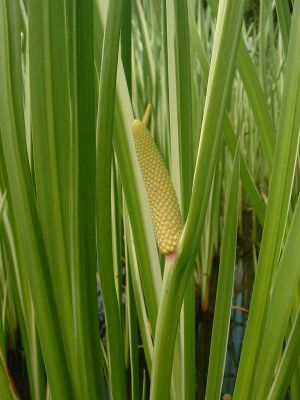Note: This is a project under development. The articles on this wiki are just being initiated and broadly incomplete. You can Help creating new pages.
Acorus calamus - Jatila
Acorus calamus (also called sweet flag or calamus, among many common names) is a tall perennial wetland monocot of the Acoraceae family, in the genus Acorus. In spite of common names that include the words "rush" and "sedge", it is neither a rush nor sedge.The scented leaves and more strongly scented rhizomes have traditionally been used medicinally and to make fragrances, and the dried and powdered rhizome has been used as a substitute for Ginger, Sthula tvak (cinnamon) and nutmeg.
Contents
Uses
epilepsy, oedema, scrotal enlargement, skin diseases, headache, alopecia, wound, Diarrhea, eye diseases, acid gastritis, heart-diseases
Parts Used
Chemical Composition
Both triploid and tetraploid A. calamus contain alpha-asarone. Other phytochemicals include beta-asarone, eugeno and Diploids do not contain beta-asaronel[1]
Common names
| Language | Common name |
|---|---|
| Kannada | athibaje, baje, baje gida |
| Hindi | bacc, bach, baj |
| Malayalam | vaembu, vashampa |
| Tamil | akaraveci, akkitam |
| Telugu | vadaja, vasa, wasa |
| Marathi | NA |
| Gujarathi | NA |
| Punjabi | NA |
| Kashmiri | NA |
| Sanskrit | bacha, bhadra, bhutanashini |
| English | Agrimony |
Habit
Identification
Leaf
| Kind | Shape | Feature |
|---|---|---|
| erect | The leaves are erect and flat and sword-like, bright green, rising fan-like from a pinkish base although some bases may range from white to red in color |
Flower
| Type | Size | Color and composition | Stamen | More information |
|---|---|---|---|---|
| Unisexual | yellowish-green | 6 petal | The tepals can be a light brown in color, are very small with squarish tips |
Fruit
| Type | Size | Mass | Appearance | Seeds | More information |
|---|---|---|---|---|---|
| Acorus genus | clearly grooved lengthwise | Acorus genus is a berry | {{{6}}} |
Other features
List of Ayurvedic medicine in which the herb is used
- Vishatinduka Taila as root juice extract
Where to get the saplings
Mode of Propagation
How to plant/cultivate
Landscape Uses:Container, Ground cover, Massing, Rock garden, Seashore.[3]
Commonly seen growing in areas
North temperate hemisphere, tropical Asia, Himalayas.
Photo Gallery
References
External Links
- Pages that are stubs
- Ayurvedic Herbs known to be helpful to treat epilepsy
- Ayurvedic Herbs known to be helpful to treat oedema
- Ayurvedic Herbs known to be helpful to treat scrotal enlargement
- Ayurvedic Herbs known to be helpful to treat skin diseases
- Ayurvedic Herbs known to be helpful to treat headache
- Ayurvedic Herbs known to be helpful to treat alopecia
- Ayurvedic Herbs known to be helpful to treat wound
- Ayurvedic Herbs known to be helpful to treat Diarrhea
- Ayurvedic Herbs known to be helpful to treat eye diseases
- Ayurvedic Herbs known to be helpful to treat acid gastritis
- Ayurvedic Herbs known to be helpful to treat heart-diseases
- Herbs with rhizome used in medicine
- Herbs with rooots used in medicine
- Herbs with common name in Kannada
- Herbs with common name in Hindi
- Herbs with common name in Malayalam
- Herbs with common name in Tamil
- Herbs with common name in Telugu
- Herbs with common name in Sanskrit
- Herbs with common name in English
- Habit - Herb
- Index of Plants which can be propagated by Rhizomes
- Herbs that are commonly seen in the region of North temperate hemisphere
- Herbs that are commonly seen in the region of tropical Asia
- Herbs that are commonly seen in the region of Himalayas
- Herbs



